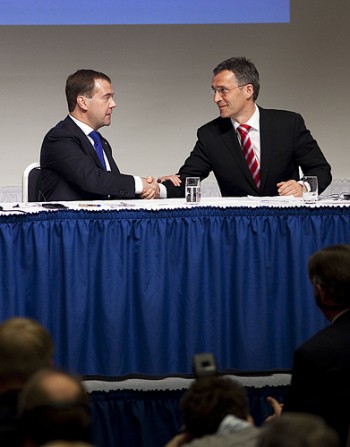Despite all the international tension at present, Norway and Russia have once again managed to strike an important agreement, this time on how to go about exploiting more oil and gas resources along their earlier-agreed territorial border in the Barents Sea. Experts argue, however, that no new oil and gas fields can be opened, or existing ones emptied, if Norway is to have any chance of meeting its climate goals as promised in another important agreement reached in Paris.

Norwegian Broadcasting (NRK) was airing the news in Norway Thursday morning that Norway and Russia have reached agreement for seismic exploration along their offshore border in the Barents. It’s an area believed to be rich in oil and gas resources, and the establishment of the border called delelinje in Norwegian was a major breakthrough during Norway’s left-center government led by Jens Stoltenberg, who now serves as secretary general of NATO.
Another breakthrough, at least for the oil and gas industry, has arrived with the Russian-Norwegian agreement on so-called “full-fold seismic.” It will allow vessels with seismic equipment on board to cross back and forth, for as long as necessary, over the Norwegian-Russian border at sea as they search for new oil and gas deposits beneath the sea floor. That will make it possible to chart that portion of the Barents Sea for the first time.
The new pact that will allow more Arctic oil and gas exploration is expected to be signed in Oslo in late November by the Russian and Norwegian oil and energy ministers Sergej Donskoj and Tord Lien. NRK reported there are still some formalities that need to be cleared up, but the agreement itself is seen as important regarding ongoing cooperation between Russia and Norway over exploitation of oil and gas resources in the far North.
Pact can put climate goals at more risk
While no dates have been set over when more oil and gas exploration can actually begin, alarms are already ringing among researchers, environmental activists and others concerned about Norway’s ability to meet its stated climate goals. They include goals for cutting carbon emissions at a time when they’ve continued to rise in Norway, instead of decline. Goals set for 2020 are unlikely to be met and now Norway’s government is only talking about goals for 2040 in its new state budget proposal for next year.
Norwegian politicians and oil industry proponents have long justified more exploration and production of oil and gas off Norway on the grounds that it’s better for the climate than oil and gas produced elsewhere. Norway’s production is claimed to be “cleaner” and more tightly regulated than that in other countries, while oil and gas also provides a much more climate-friendly alternative to coal.
The claims are highly debatable, and Norwegian Professor Carlo Aall is among those questioning such logic. In a recent commentary published in newspaper Aftenposten, Aall, who also leads climate research for Vestlandsforskning in Western Norway, claimed that the world and not least Norway “must begin to plan for a managed and fair reduction of today’s production of coal, oil and gas.” A reduction, it’s argued, is the only way Norway can have any hope of meeting its commitment to cut its own carbon emissions at home.
Need to shut down existing fields, not find and open new ones
Aall cited a new study by the US research institute Oil Change International that highlights why the UN climate goals reached in Paris last year “require a managed decline of fossil fuel production.” The study is based on statistics from the International Energy Agency, the UN climate panel and Norway’s own oil and gas analysis firm Rystad Energy.
“The main conclusion,” wrote Aall, is that we must quickly decide which coal, oil and gas fields we need to shut down that today are in full production … and especially not go looking for new fields.” He said the new report shows that even if all coal operations are shut down worldwide, emptying the world’s existing oil and gas fields “will still bring us over” the goal of limiting global warming to 1.5 degrees. All use of fossil energy doesn’t need to be halted “overnight,” he wrote, but the global community must scale down existing oil and gas production.
Aall also noted that it will be difficult for Norwegians to argue that they should still be allowed to search for and produce more oil and gas. “It’s not likely the rest of the world will accept that an extremely wealthy country like Norway has more right to produce the smaller amount of fossil fuels that the world can can allow itself, than poorer countries like Nigeria or Sudan,” he wrote, “even if their production releases more carbon emissions than Norway’s.”
Moves to make it easier to exploit more Arctic oil and gas resources, like those proposed in the new pact with Russia, are at thus odds with the experts’ calls to reduce and not expand fossil fuel production. Norwegian officials on both ends of the political spectrum nonetheless remain keen to prolong and expand Norway’s oil and gas industry, because of its importance to the economy. The new Barents agreement is likely to be hailed as good for the economy and a sign that Russia and Norway are still good neighbours, while politicians keep putting off the deadline for meeting climate goals they call “challenging.”
newsinenglish.no/Nina Berglund

